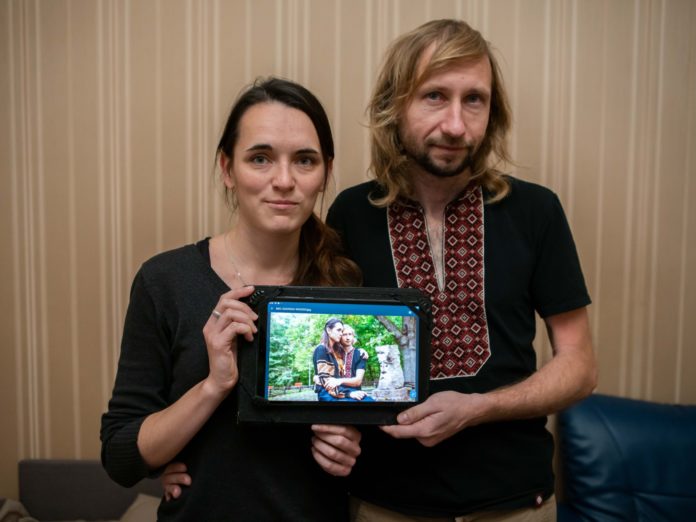Listen to this story:
Tbilisi, Georgia – When Oksana Slipchenko first exchanged glances with the man she would eventually marry, she was immediately drawn to his eyes.
“They were like … a small kitten’s eyes,” she recounts with a giggle. She pauses to think of a more appropriate term. “I think defenceless is more the word.”
As the couple sits in their sparsely furnished one-bedroom apartment in Tbilisi on a November afternoon, Oksana’s husband Sergio Skudin flushes with embarrassment.
Oksana, who is Ukrainian, and Sergio, who is Russian, first met on New Year’s Eve 2018, during a three-day train journey across Belarus. Oksana, a professional pianist who worked as a concertmaster at a music school in Irpin, Ukraine, was immediately drawn to the shy, soft-spoken Sergio, an archaeologist and independent researcher who often worked on expeditions for the Russian Academy of Sciences.
An initial friendship soon blossomed into a long-distance relationship, with the two frequently crisscrossing borders to see each other. In the summer of 2020, they married in Kyiv. Oksana quit her job and moved to Russia, accompanying Sergio on archaeological digs, including a months-long expedition to the site of the ancient Greek colony of Chersonesus in Sevastopol in Russian-occupied Crimea.
Oksana’s father, who became mistrustful of Russians after Russia annexed Crimea in 2014, was initially opposed to her marriage. “But when he saw Sergio for the first time, he said, ‘OK! It’s your choice, maybe he’s not 100 percent Russian’,” Oksana recalls.
The political enmity between their countries – and the fighting in eastern Ukraine – were topics the couple frequently discussed, but these never came in the way of their relationship. Russia’s full-scale invasion of Ukraine a year ago changed that.

‘Had to get away’
At the time of the invasion, the couple was living in the southeastern Russian city of Rostov-on-Don. “I was full of hatred for Russia and pain for my people. I knew I just had to get away,” 30-year-old Oksana recalls.
Sergio suggested they head south to Georgia, one of the few countries where they could enter visa-free with their respective passports. After a long overland bus trip, they crossed into Georgia on March 4, travelling just with what they could carry in their backpacks.
Since arriving in the Georgian capital, the couple has moved homes twice. Rent has soared with the influx of an estimated 100,000 Russian exiles – some of them opposed to the war and some escaping sanctions or mobilisation – who far outnumber the 25,000 Ukrainians who sought refuge in Georgia.
One of their biggest initial challenges was finding employment. Oksana found work as a piano teacher and tuner and occasionally plays in restaurants and bars. But 38-year-old Sergio has struggled to bring in an income.
Instead, he has been caring for Oksana’s mother, a wheelchair user who survived the Russian siege of Bucha in the early weeks of the fighting by hiding in a basement. She was evacuated to Tbilisi and now shares the apartment with the couple.
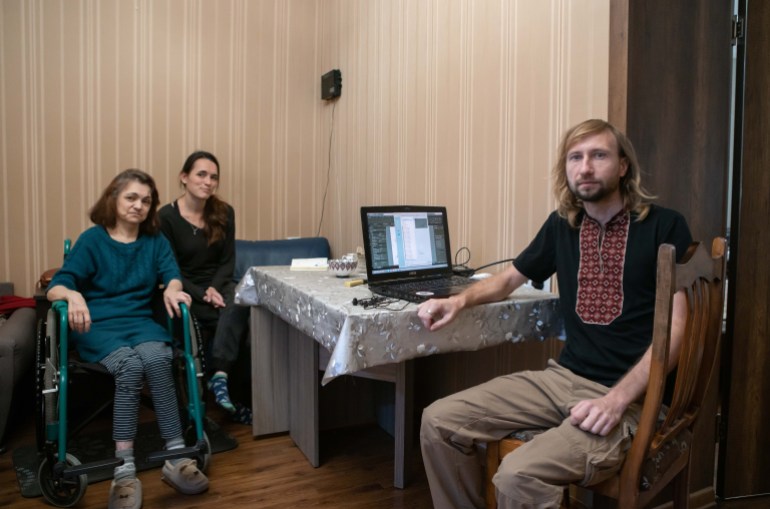
New tensions
Sergio has an air of bewilderment as he tries to describe his thoughts about the war. “I feel disappointment and shame,” he says finally.
He says he is opposed to the war, but at a time when many Ukrainians accuse Russian citizens of inaction, he believes common Russians are powerless. “Even if people protested daily, I doubt it can change anything with the strong military regime in place,” he explains.
But he admits that he might not have left Russia if not for Oksana.
“Sergio is not a political person,” Oksana chimes in defensively.
She says that her anger is directed towards the Russian regime and its army of “orcs” – not at Russian citizens. “I still try to believe in humanity,” she explains.
But the war has brought new tensions to their life together. Financial worries, uncertainty about the future and Sergio giving up his academic career have strained the relationship.
Oksana often feels guilty that Sergio has not found work, and as the more digitally savvy of the two, is helping him learn a software programme in the hopes that he can continue his career online.
Discussions about the war itself have also been a source of friction, with the couple disagreeing over differences in the words they use. Only once has this turned into a huge argument after Sergio read out Russian news headlines referring to the October bombing of a key bridge in Crimea as a “terrorist act”.
“I got mad and screamed how it could be a ‘terrorist attack’ to bomb a bridge” when Russian soldiers “were bombing apartments and killing children and women every day”, Oksana recalls.
After that incident, they have tried not to talk about the war.
When asked if he wants to return home someday, Oksana teasingly says that he could go and “get mobilised”. Sergio laughs uneasily. Chided by her mother, Oksana quickly apologises for her joke. “I can’t imagine how to live life without him,” she says.
Like Oksana and Sergio, other Ukrainian-Russian couples in Georgia are having to navigate the new challenges the war has brought to their relationships.

Relationship taboos
Mariam Pesvianidze, a 34-year-old Russian-Georgian filmmaker born and raised in Moscow, knows all too well about having to choose her words carefully when discussing the war with her Ukrainian boyfriend.
The couple has lived together in Tbilisi since 2018, but despite their shared political views, some topics have become taboo since the war began.
“I need to be careful not to say anything to trigger him. Any mention of problems faced by Russians, even Russian activists and political dissidents, upsets him,” says Mariam.
Her boyfriend, she explains, believes that given the enormous suffering in Ukraine, Russians have no right to complain about their situation.
Mariam exudes a buoyant energy that she has thrown into activism since her teenage years. Speaking at a downtown Tbilisi café housed in an 18th-century red brick building, she shares how, during her film school days in Moscow, she attended countless human rights protests and political rallies as a supporter of Boris Nemtsov, the late opponent of President Vladimir Putin. But she grew increasingly despondent as her country cracked down on activists and political opponents.
She says her political views were influenced by her Georgian father, who separated from her Russian mother following 32 years of marriage after she announced her support for Putin and the annexation of Crimea over a family dinner.
Within the year, both father and daughter had left Russia. Mariam initially moved to Odesa in Ukraine, but when Nemtsov was assassinated in 2015, she decided to join her father in Tbilisi, where she set up a film production company with some Ukrainian friends and launched one of the city’s first plastic recycling non-profits.
It was through mutual Ukrainian friends that she first met her boyfriend. “At first I found him annoying and loud, but I was soon enamoured by his huge teddy bear personality and large heart,” she says of her 32-year-old boyfriend who declined to be interviewed for this story.
Her partner had initially moved to Tbilisi to recuperate from shrapnel injuries he sustained while serving in the Ukrainian army in Donbas.
“He already hated the Putin regime and Russian politics back then, but [his anger] was never directed personally at anyone,” says Mariam.

Hurts not to talk
Mariam and her boyfriend could once have long intense conversations about Russian politics and society without them turning into arguments. They mixed with like-minded Russians, Belarusians and Ukrainians. But since the full-scale invasion of Ukraine, things have changed.
In Georgia, people started questioning the culpability and collective responsibility of Russian citizens opting to flee their country rather than resist their government.
Solidarity with Ukraine, and animosity towards the wealthier new immigrants who are seen as pricing out locals, are visible in graffiti telling Russians to “go home”.
This sentiment has taken a toll on her friendships, says Mariam, who is an active pro-Ukrainian anti-war campaigner. “It was hard for me to hear terrible things about all Russians – painting us all with one brush. It was like our friendship didn’t matter any more,” she says, explaining that she also left the production company she co-founded to avoid causing discomfort.
Her boyfriend stopped interacting with his Russian friends and, with the two of them living together, Mariam had to resort to meeting her Russian friends only outside.
Mariam understands that the influx of Russians into Tbilisi was difficult for her boyfriend who was already dealing with post-traumatic stress disorder (PTSD) from his time in the army. “I know his grief is much bigger and I completely understand silence and empathy is needed from my part, but it also hurts not to be able to talk about my grief without guilt,” she says, referring to how she feels about the crackdowns on anti-war protesters in Russia, and some friends severing ties.
Mariam has turned to therapy to discuss her relationship while also focusing on her and her boyfriend’s planned future together. She says they are applying for visas to move to Canada, where her boyfriend hopes to put some distance between himself and the war he is reminded of daily.
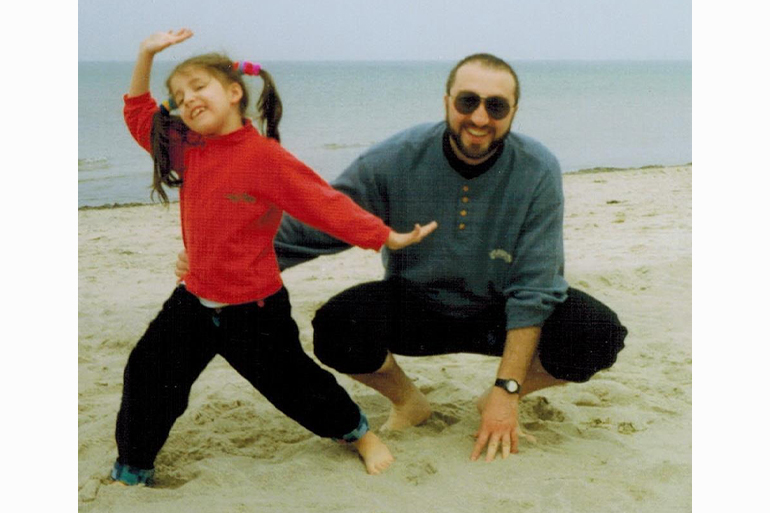
A psychologist’s take
Diana Khabibulina, a psychologist in Tbilisi, is familiar with the friction between Russians and Ukrainians that has erupted since the war.
As a volunteer with a local group that was set up to provide free counselling to the first wave of Ukrainian women and children who arrived in Georgia as refugees, Khabibulina’s team initially provided group therapy to Ukrainians as well as ethnic Russians who had escaped from Kherson during the early days of the war.
Some Russians living in Georgia also signed up for therapy sessions that were conducted in Russian. “Everyone was in shock and there was a lot of mixed emotions. [The war] triggered pain and trauma in everyone,” she recalls. But soon, with tensions getting in the way, group therapy sessions were replaced with individual counselling for some people.
“They did not know how to communicate with each other … Many Russians were also coping with a lot of guilt and could not express themselves freely,” says Khabibulina.
She fears that the breakdown in relations between the groups, particularly for people with families on both sides of the conflict, could lead to individual and collective trauma with effects felt for decades to come.
Khabibulina, who is of Russian and Georgian heritage, recalls how the break-up of the Soviet Union in 1991 and the brutal civil war that followed in Georgia from 1992 to 1994 – when Russian-backed separatists took control of the breakaway regions of Abkhazia and South Ossetia – left deep scars and fuelled mistrust among different ethnic groups in Georgia for years. “My family has lived here for generations but some of our neighbours stopped talking to us because they saw us as Russians. I was a young girl then and this stayed with me for a long time,” the 46-year-old explains.
Although she has not worked directly with Russian-Ukrainian couples, Khabibulina has counselled people from both countries struggling with families in Russia who support the war. Respectful open discussion can save relationships, she believes. “We can practise empathy without sharing beliefs. Listen and when you can’t take it any more, take a pause but don’t cut ties,” Khabibulina says.

‘The end of my relationship’
But for Levan Pesvianidze, Mariam’s 60-year-old father, separation was inevitable. “If your spiritual and moral values don’t connect, that’s when you can’t sustain a relationship any longer,” he insists.
“When the person I considered my closest ally was happy [Russia] took Crimea ‘back’, it was the end of my relationship,” Levan says candidly.
He and his wife had met in Dresden as engineering students during the Soviet Union and moved to Moscow where they continued to live after the dissolution of the Soviet Union.
A burly man with a hearty laugh, Levan, says he is still grateful for his life with his ex-wife with whom he owned a successful marketing business in Moscow, even though he was always uneasy about living in Russia and taking on a Russian passport as the former Soviet republics became independent nations. But every time he expressed a desire for them to move to Georgia, his then-wife, with whom he had three children, would dissuade him, pointing to their comfortable life. Levan’s discomfort grew when Putin came into power and gradually cemented his authoritarian rule.
Levan recalls how his wife opposed Russia’s 2008 war on Georgia. But her views changed over the years when it came to Ukraine, believing that Russia had a right to Crimea and that the current invasion was spurred by the West trying to expand the NATO bloc.
He says he wishes he could have saved her from Putin’s propaganda. “She’s a highly educated, intelligent person but she still fell for it,” he says.
Bitter arguments
Ukrainian-born Dimitri, a pseudonym to protect his identity, and his Russian wife have found themselves on opposite sides of the conflict.
They met at a local boxing gym in their late teens. “Back then, there was no war, no Crimea. We were very young and deeply in love,” recounts Dimitri who, due to security concerns, preferred to correspond over WhatsApp messages from Moscow.
They married in their early 20s and had their first child in 2014. At the time, Dimitri, now 30, never imagined that a war between their two countries would become the subject of bitter arguments, after which he has sometimes asked himself why he married the “enemy”.
Dimitri says his wife, a devout Orthodox Christian, has been conditioned by her family and the church to believe that Russia’s invasion was an act of self-defence against the West.
In the early days of the war, the couple argued frequently, nearly splitting up twice. When Dimitri insisted they leave Russia, they were among the tens of thousands of Russians who caught the last available flights out of Russia and into Tbilisi in March.
But very soon, the couple with three children below the age of 10, found themselves unable to afford the high cost of rent. After five months in Tbilisi, they flew back to Moscow.
The two have since agreed to work out their differences for their children, but Dimitri says it is a daily struggle to fight the grind of Russian propaganda his wife consumes on TV and social media. With all criticism of what Russia calls its “special military operation” punishable with up to 15 years imprisonment, there are no voices to counter the steady stream of state-sponsored disinformation.
“I understand that my wife is a victim of propaganda,” he says, adding that he has completely severed ties with his in-laws who are open supporters of Putin. This, in turn, has further strained their marriage.
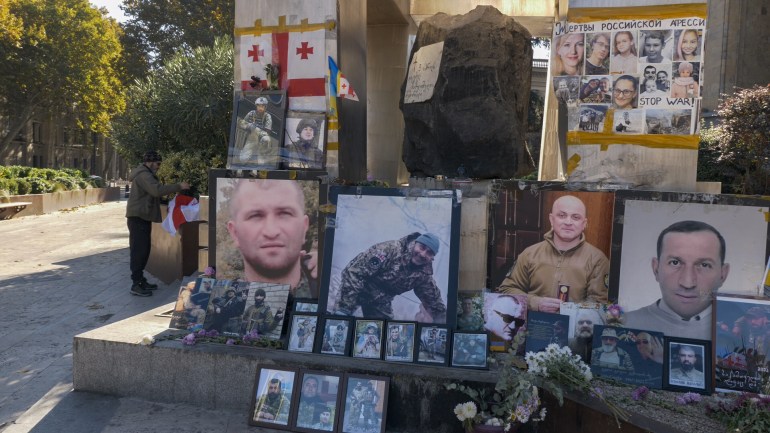
Prisoners of war
Dimitri was born in Kyiv and was a child when his family moved to Russia in search of work in the late 1990s, a time of economic, social and political tumult for post-Soviet countries following the dissolution of the USSR. In Moscow, he earned a law degree and, after a few years working at a Russian law firm, obtained a Russian passport.
But he has always felt like an outsider. “I’ve always remained Ukrainian at heart. That’s how my parents raised me. I speak Ukrainian fluently still and wore the vyshyvanka [traditional embroidered Ukrainian shirt] in Moscow … I’ve lived with [Russians] almost all my life but they almost always called me khokhol [a derogatory term that refers to a Ukrainian Cossack topknot hairstyle],” wrote Dimitri.
Since returning to Moscow, Dimitri has found some comfort and purpose by working as a defence lawyer for captured Ukrainian soldiers – a job with risks given his Ukrainian heritage, and the reason he requested anonymity.
Although his wife, who is a stay-at-home mother, remains unsure about Russia’s role as an aggressor in the war, she is compassionate about the plight of Ukrainian prisoners of war. She helps search online forums to identify those in need of legal representation and fills out paperwork for Dimitri’s cases. Dimitri hopes this is a sign that his wife may one day change her stance. Despite everything, he says, “We absolutely love each other.”
War’s psychological consequences
Experts have warned of the enormous long-term mental health consequences of the war for Ukrainians. “Populations that are affected by military conflict, violence and displacement, are much more vulnerable to mental health disorders like depression, anxiety and post-traumatic stress disorders,” says Dr Darejan Javakhishvili, a professor of psychology at Tbilisi’s Ilia State University. And these can affect people’s relationships – whether with partners, families or friends, she adds.
She suggests that many Russians may face a huge moral dilemma. “We can only speculate. But there is a chance that many Russians are caught between their identity and loyalty to the Russian statehood and their internal values,” Javakhishvili reflects.
She believes that moral injury, or the psychological distress arising from perpetrating, witnessing or failing to prevent actions that go against a person’s morals, could be quite high among Russians.
“The war experience”, direct or indirect, is a “traumatic stress” that can heavily affect relationship dynamics, adds Nino Makhashvili, a psychotherapist, researcher and colleague of Javakhishvili. This, she says, could apply to anyone emotionally affected by the war, be it Ukrainians, Russians, Georgians or anyone closely following the events who identifies strongly with one of the sides.
People may become “short-tempered, irritable, even aggressive or withdrawn”, she explains.
The two women have collaborated on research into the social and mental health effects of war on internally displaced people (IDPs) following the 1990s’ conflict in Georgia as well as in Ukraine, where close to a million Ukrainians were displaced following the annexation of Crimea and when pro-Russian separatists took control of swathes of the Donbas region in 2014.
This research could hold lessons for the present conflict.
“Unfortunately, we saw splitting of a lot of families since 2014 and not only mixed marriages, but Ukrainian couples who did not share the same ideology,” Makhashvili explains over email.
“Every family has its dysfunctions,” Javakhishvili says. But if partners have a mutual understanding of the other’s beliefs, it’s a good basis “to try and work through differences. There is not any one single reason for [the] collapse of relationships … and [the] Russian-Ukrainian war cannot be one single reason for divorce.”
Drawing on past research, both experts believe that trauma from this war is likely to persist beyond the present generation.
“Even after almost 20 years from the 1990s’ war, the mental health burden among IDPs [in Georgia] were very high,” warns Makhashvili.
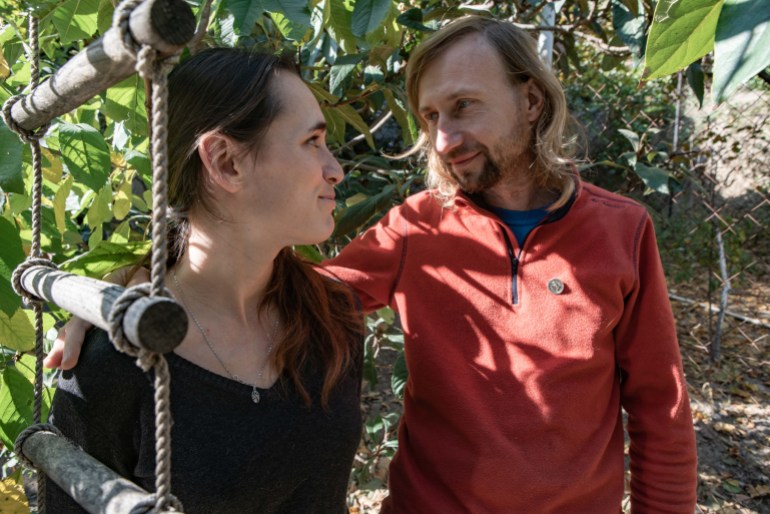
‘New reality’
Despite her best efforts to preserve her relationship, Mariam broke up with her Ukrainian boyfriend in late December, about a month after she was first interviewed for this story. She admits his animosity towards her pain as well as her inability to express herself freely was a big part of her decision to end their nearly five-year-long relationship.
He had also turned down her requests to seek therapy together. “He [was] too confused and did not want to introspect and change at all,” she says. Her ex-partner’s visa for Canada was approved, and he moved there earlier this year. Mariam has also decided to leave Tbilisi and plans to relocate to Lisbon.
She says she will continue to campaign for an end to the war in Ukraine. Mariam worked with a group of local Russian, Ukrainian and Georgian activists to launch an anti-war art exhibition in late February with paintings, performances and installations from anti-war Russian musicians and artists in exile.
When recently asked over WhatsApp if she has any hope of the war ending soon, she wrote: “Hope is not my feeling. I prefer to fight as always – for freedom, human rights and truth.”
Oksana and Sergio see the war as cindering any possibility of them living in Ukraine. Despite Ukrainians welcoming Russian dissidents over the years and those fighting for Ukraine, Oksana believes that Sergio would be akin to the enemy. “I cannot ask that of him [to live in Ukraine] for the sake of my own people,” she says.
For Oksana, the war is a “new reality”.
“It will stay with us for a long time.”
The only foreseeable future she can see with Sergio is in a country not of their own, which for now is Georgia. “Maybe, South America someday but that’s a dream,” she adds.
